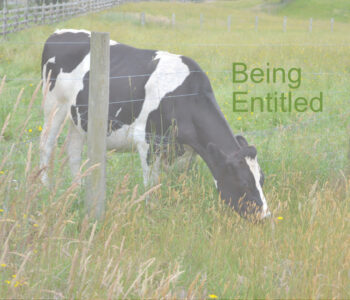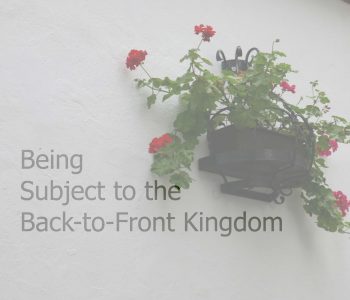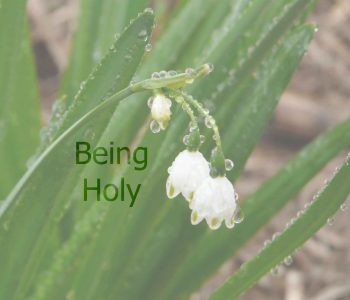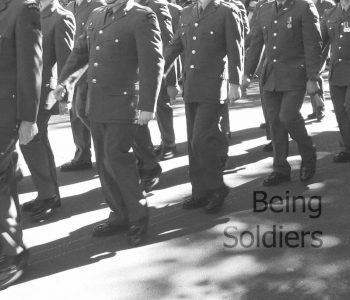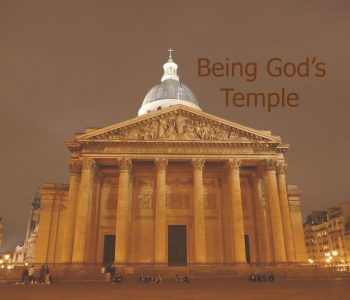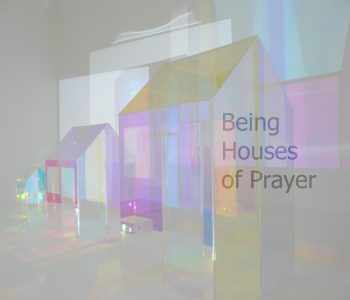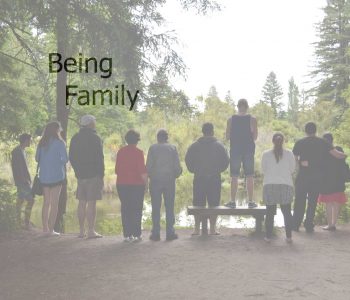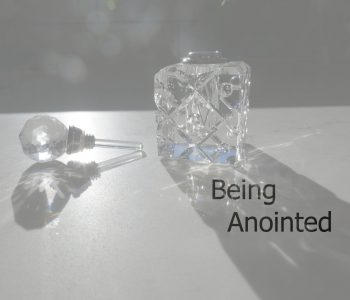 Being...
Being...
Being Like Little Children
God’s ways are usually the opposite to our ways; in His kingdom to be mature is to be like a little child, not childish, but LIKE a little child. Among other things little children are loving, trusting, teachable, uncomplicated, simple, forgiving, curious and innocent. Our Father looks for these qualities to mature in us as His children – He longs to teach those who are like a little child, who know that they know nothing…
Children do not assume that they can teach anyone anything, yet without realising it they often teach others simply through who they are and by the simple things they say or do.
God can trust His humble child-like sons and daughters with great truths, great wisdom and great strength simply because they know not only their Father, but they also know who they themselves are; they know that they are simply one of His little children. They are teachable and ready to receive correction from their Father and from brothers and sisters; it does not surprise them or upset them when they are wrong or make mistakes because they know they are but a child and that mistakes are one of the ways little children learn. God can use such ones to display His strength and His wisdom because they will not take any glory to themselves; they KNOW that they are nothing but little children.
Children ask lots of questions, they are constantly learning. Only those who know that they don’t know very much are humble enough to risk asking questions and potentially displaying their ignorance. Adults are not so ready to do this, but little children don’t care; they already KNOW that they don’t know very much and that they need to learn much, much more! There is the risk that if the child does not ask, the Parent will not give the answer. Even so, no good father is going to tell his children things which they do not need to know or that would be harmful for them. Children should be innocent. For example, as God’s children, we do not need to know all the details of the enemy’s ways and means but rather need to know our Father’s ways; we know that He will tell us whatever we need to know about our enemy, when we need to know it. He knows better than us what we need to know… We should remain innocent to what is evil and be wise to what is good (Romans 16:19).
“Out of the mouths of babes and unweaned infants You have established strength because of Your foes, that You might silence the enemy and the avenger.” Psalm 8:2. Who would think that the innocence and weakness of infants could silence God’s enemy? Yet God’s ways are so much higher than ours! We need to be those who KNOW our God. The people who know their God shall prove themselves strong and shall stand firm and do exploits (Daniel 11:32). Parabolic, symbolic language is not always easy to understand, yet Jesus deliberately spoke in parables so that KNOWING Him personally and intimately would be the key to all revelation and understanding. He said, “I thank You, Father, Lord of heaven and earth, that You have hidden these things from the wise, clever and learned, and revealed them to babies, to the childish, untaught, and unskilled. Yes, Father, such was your gracious will and good pleasure.” Matthew 11:25,26
In Luke, immediately after the Lord’s prayer Jesus said “Which of you who has a friend will go to him at midnight and will say to him, Friend, lend me three loaves of bread. For a friend of mine who is on a journey has just come, and I have nothing to put before him. And he from within will answer, Do not disturb me, the door is now closed, and my children are with me in bed; I cannot get up and supply you with anything? I tell you, although he will not get up and supply him anything because he is his friend, yet because of his shameless persistence he will get up and give him as much as he needs. So I say to you, Ask and keep on asking and it shall be given to you; seek and keep on seeking and you shall find; knock and keep on knocking and the door shall be opened to you.” Luke 11:6-9
In this parable, God is represented as being the friend in the house who gives the Bread – so who represents us in this parable? Where are WE in this picture?
We may see ourselves as being the friend without bread who kept asking for bread and we learn that we are to be persistent in prayer – to ask and keep asking so that we will eventually receive because of our persistence. Or perhaps there may be more to this picture because there were more people involved than just the two men. Here is another possible interpretation that you may want to consider… Are we normally referred to in the Scriptures as God’s friend or His children? We are His CHILDREN, and in this parable we are exactly where we are meant to be: in our Father’s house, resting in His bed! Banging on someone’s door at midnight when they are already in bed, is rather rude; it would be inconsiderate and thoughtless in just about any culture. As Jesus said, “Which of you will go to a friend at midnight and ask for bread?”when it is the end of the day?
Jesus seems to have hinted at this interpretation in verses 11-13 “What father among you, if his SON asks for a loaf of bread will give him a stone; or if he asks for a fish will instead of a fish give him a serpent? Or if he asks for an egg, will give a scorpion? If you then, evil as you are, know how to give good gifts to YOUR CHILDREN, how much MORE will your heavenly Father give the Holy Spirit to those who ask Him!”
The three loaves of bread may be representative of the Father, Son and Holy Spirit. From the context it seems that Jesus was using two examples: physical and spiritual – one is easily seen and obvious, the other is hidden and unseen. He first mentions physical food, and then speaks of heavenly food – the Holy Spirit. He Himself is our Bread and Meat. We are not awake at midnight with no Bread to feed ourselves or others with; we LIVE with the Bread Provider and have no lack of it! It seems to be speaking of two different types of asking and two different types of relationship. One is asking from a position of lack and does not have an intimate relationship, the other is asking from a position of abundance and lives with the Father. The friend had no bread so had to keep asking till he was given some; but the children of the house knew that there was plenty of bread available and they could ask whenever they were hungry and expect to receive Bread from their Father.
This is a very similar message to the parable of the ten virgins/bridesmaids (Matthew 25:1-13). There are four groups of people in both parables. Firstly the Groom and the Father/Friend. Secondly the five foolish virgins and the visitor who have no oil/bread of their own. Thirdly the five wise virgins and the rude friend who know where to GET a supply of Oil/Bread, they know the Groom and Friend but it is not an intimate relationship. They know Him as the Giver, but don’t know Him as THE Gift – they don’t LIVE or dwell with Him in intimate relationship where He IS their Life and Source of all. The fourth group are hidden and are not obvious although they are essential to both pictures; the Children are in bed, out of sight and hidden, and the Bride is at the wedding. There would be no Father without the Children and there would be no Groom or Wedding without the Bride. We are called to be His Bride and His Children! BLESSED indeed!
Too many settle for just knowing God as a Friend rather than as a Father. Too many settle for just knowing Christ as a Groom at a wedding rather than knowing Him as their Groom/Husband. The reason the foolish virgins were not admitted to the wedding feast was because He did not KNOW them (vs 12). He is always wanting and seeking intimacy and close, CLOSE relationship with us. The five wise virgins had enough oil in their lamps for one evening of celebration; but compare that with the option of being united for all eternity with the One Who IS the Light of the world! They were attendants or bridesmaids at a great wedding feast; but compare that to being the Bride who is in love with, and being married to the One who is Love Himself! And the rude friend knew where to get bread at a late hour; but compare that to living night and day with the One Who IS the Bread of Life!
Both parables are at midnight; which may indicate the darkness and the lateness of the hour and that it is time to be in the Father’s house, resting in Him and not doing our own works or trying desperately to find Bread or Oil through our own efforts. When we live in His house we rest in Him because we KNOW Him as “our Father”! While others may be knocking on doors at midnight because they do not have Bread to break with others – we are not lacking Bread because He is our Father who abundantly provides ALL His children need, even while we sleep! Except the Lord builds the house, they labor in vain who build it; except the Lord keeps the city, the watchman wakes but in vain. It is vain for you to rise up early, to take rest late, to eat the bread of toil – for He gives to His beloved in sleep! Psalm 127:1,2
When David was hurting, frustrated, discouraged, angry etc, He TOLD God so and the Psalms are full of his honesty! Christ IS Truth and the Greek meaning of the word for Truth is also Reality. Our little children are real; they display and tell us their feelings openly and it is good and healthy that they do so. It would be an unnatural relationship if they never voiced their disappointments and hurts to their parents but at the same time they know that there are limits and they know their parents well…
A little child KNOWS their Father’s character, they KNOW that He would not lie to them and so they simply trust Him because of what He has told them and because of Who they know! Very simple, yet very profound. The attitude of the child honors the Father because they trust that He will provide all they need instead of feeling the need to persistently hassle Him for it (although children naturally DO that sometimes too!)
The parable of the friend at midnight is given immediately after the disciples had asked Jesus to teach them to pray and He gives the prayer: “Our Father Who is in Heaven…” When we know God as “our Father”, much of our praying will be changed. So much of what WE think we should pray, may exhibit our unbelief or distrust of Him. He is our FATHER! A Father is primarily a provider, protector and educator. No child keeps going to their father to ask over and over again for the basic necessities of life; if they keep doing so the father will feel hurt that his children do not trust him for even the basics; they must think he is an unloving Father. All good fathers will provide the necessities of life without needing to be constantly entreated. Our Father is the epitome of Goodness and Love! Jesus clearly said this in Matthew 6, He clothes the lilies and feeds the birds, how much MORE so His very own children whom He dearly loves? This was part and parcel of His teaching the disciples how to pray.
The difference is in the faith and trust, or lack thereof, which is behind the asking. Children are incredibly trusting and carefree! The children in the house of the Father will ask for Bread whenever they are hungry, knowing full well that they will receive it; they know that there is a limitless supply available for the taking! But the friend had to go knocking at the door at a very late hour with no guarantee of receiving anything…
Little children like to remain close to their parents. There are many things they know they cannot do without their parent’s help so they ask for help and are reliant and dependent upon their parents and siblings to help them. According to the world, to be mature is to be totally independent from our parents, but according to God’s kingdom to be mature is to be totally dependent on Him.
Little children often imitate and copy their parents, Jesus Christ said that He Himself could do NOTHING from Himself but only what He saw the Father doing “for whatever the Father does is what the Son does in the same way” (John 5:19). Therefore be imitators of God, copy Him and follow His example, as well-beloved children imitate their father. Ephesians 5:1
Children know when a parent is upset, it affects them because their parents are an integral part of their lives. Very little children have not yet developed the understanding that they are a separate being, they consider themselves as part of their parents; their identity is tied in with their parent’s. Their parents are the center of their universe!
Children also need, and know about, discipline/training. A well trained child will immediately do what they are told. You must submit to and endure correction for discipline; God is dealing with you as with sons. For what son is there whom his father does not thus train and correct and discipline? Now if you are exempt from correction and left without discipline in which all of God’s children share, then you are illegitimate offspring and not true sons at all. Moreover, we have had earthly fathers who disciplined us and we yielded to them and respected them for training us. Shall we not much more cheerfully submit to the Father of spirits and so truly live? He disciplines us for our certain good, that we may become sharers in His own holiness. Hebrews 12:7-10.
Little children who are confident and secure in their Father’s love will accept difficult decisions and situations because they know, without a doubt, that their Father has planned the best for them because He LOVES them. Even though the child may not be able to understand WHY they are being submitted to the trials and testing, yet they know it is always for their ultimate good because their Father sees the big picture and knows exactly why, and they trust Him because they know deep in their hearts that He loves them!
Little children seem to naturally be trusting and full of faith. They are transparent and real, they do not hide their emotions and will say (or display!) what they are thinking because they are innocent, honest and have no fear of man. They have not yet been influenced or formed by the world or by people’s expectations of them. Little children are not easily offended; but although they may be easily hurt because they are sensitive, they also readily forgive and forget.
A little child owns nothing. Everything he or she has and is, is the property of their Father. Every good and perfect thing comes from Him, and just as our earthly fathers delight in giving good gifts to their children, so our heavenly Father also delights in giving us the greatest gift of all – HIMSELF – Father, Husband, Lover; GOD.
Jesus called over a child, whom he stood in the middle of the room, and said, “I’m telling you, once and for all, that unless you return to square one and start over like children, you’re not even going to get a look at the kingdom, let alone get in. Whoever becomes simple and elemental again, like this child, will rank high in God’s kingdom. What’s more, when you receive the childlike on my account, it’s the same as receiving Me. Matthew 18:3-4 TM.
